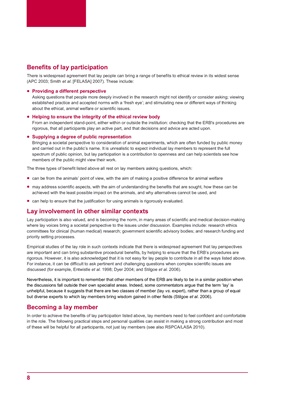
8
Benefits of lay participation
There is widespread agreement that lay people can bring a range of benefits to ethical review in its widest sense
(APC 2003; Smith et al. [FELASA] 2007). These include:
Providing a different perspective
Asking questions that people more deeply involved in the research might not identify or consider asking; viewing
established practice and accepted norms with a "fresh eye"; and stimulating new or different ways of thinking
about the ethical, animal welfare or scientific issues.
Helping to ensure the integrity of the ethical review body
From an independent stand-point, either within or outside the institution: checking that the ERB's procedures are
rigorous, that all participants play an active part, and that decisions and advice are acted upon.
Supplying a degree of public representation
Bringing a societal perspective to consideration of animal experiments, which are often funded by public money
and carried out in the public"s name. It is unrealistic to expect individual lay members to represent the full
spectrum of public opinion, but lay participation is a contribution to openness and can help scientists see how
members of the public might view their work.
The three types of benefit listed above all rest on lay members asking questions, which:
can be from the animals" point of view, with the aim of making a positive difference for animal welfare
may address scientific aspects, with the aim of understanding the benefits that are sought, how these can be
achieved with the least possible impact on the animals, and why alternatives cannot be used, and
can help to ensure that the justification for using animals is rigorously evaluated.
Lay involvement in other similar contexts
Lay participation is also valued, and is becoming the norm, in many areas of scientific and medical decision-making
where lay voices bring a societal perspective to the issues under discussion. Examples include: research ethics
committees for clinical (human medical) research; government scientific advisory bodies; and research funding and
priority setting processes.
Empirical studies of the lay role in such contexts indicate that there is widespread agreement that lay perspectives
are important and can bring substantive procedural benefits, by helping to ensure that the ERB"s procedures are
rigorous. However, it is also acknowledged that it is not easy for lay people to contribute in all the ways listed above.
For instance, it can be difficult to ask pertinent and challenging questions when complex scientific issues are
discussed (for example, Entwistle et al. 1998; Dyer 2004; and Stilgoe et al. 2006).
Nevertheless, it is important to remember that other members of the ERB are likely to be in a similar position when
the discussions fall outside their own specialist areas. Indeed, some commentators argue that the term "lay" is
unhelpful, because it suggests that there are two classes of member (lay vs. expert), rather than a group of equal
but diverse experts to which lay members bring wisdom gained in other fields (Stilgoe et al. 2006).
Becoming a lay member
In order to achieve the benefits of lay participation listed above, lay members need to feel confident and comfortable
in the role. The following practical steps and personal qualities can assist in making a strong contribution and most
of these will be helpful for all participants, not just lay members (see also RSPCA/LASA 2010).